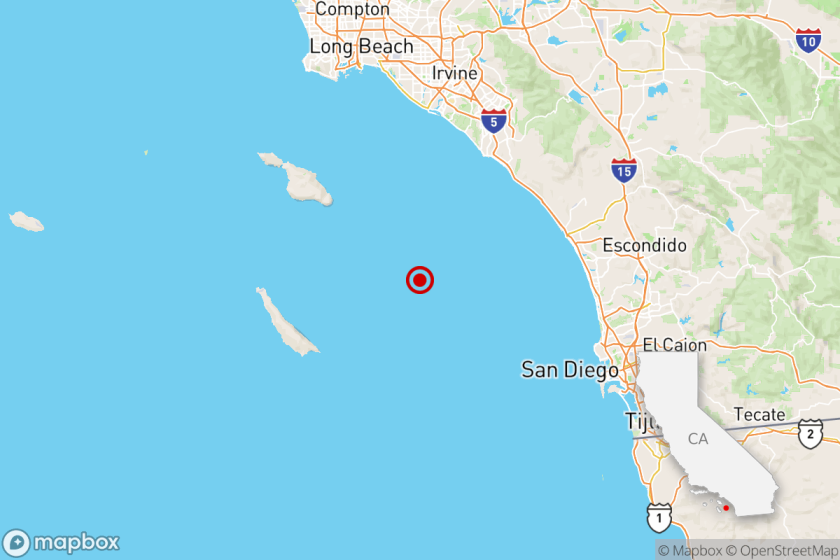Quake Cited as Key to Drop in L.A. Crime Rate : Law enforcement: First-quarter decline also is attributed to extra officers on the streets. Community-based policing, improved technology may be factors.
It was not man, but nature that caused crime to decline in Los Angeles during the first quarter of 1994.
The Northridge earthquake was the key reason the homicide rate dropped 30% and other major crime declined, compared to the first quarter last year, according to detectives, criminologists and some police officials.
Other factors contributed to the crime decrease, some police officials said, including early success with community-based policing and more aggressive police work in high-crime areas. But the earthquake played the biggest part, said Marcus Felson, a USC sociology professor.
“When people stay at home, for whatever reason, crime goes down,” said Felson, author of “Crime and Everyday Life.” “They’re less likely to be a victim and they’re less likely to be a perpetrator. And they’ll be more likely to supervise their kids. Put it all together and this means less crime.”
In the days after the earthquake the law enforcement mobilization, which put thousandsof additional officers on the streets, also played a part in the decline in crime. Crimes that experts say can be deterred by uniformed police officers--repressible crimes--dropped 21.5% during the second half of January, according to LAPD records.
Department officials noted that a similar drop in repressible crimes occurred during the weekend after last year’s federal verdicts in the Rodney G. King civil rights case. At that time there also was a huge law enforcement presence on the streets.
In Los Angeles, there are an average of more than 500 property crimes a day, which include burglary, theft from cars and auto theft. For the week after the earthquake, the citywide average dropped to about 400 a day.
“When a city is devastated, like Los Angeles was after the earthquake, you see a real drop in hostility on the streets,” said Rampart Division Detective Terry Wessel. “For at least two weeks following the earthquake, crime in our area dropped to extremely low levels. People were shellshocked. In fact, some still are.”
An edict late last year by the Mexican Mafia threatening to kill gang members who commit drive-by shootings might be a minor contributing factor to the drop in homicides, Wessel said.
“I’ll give some credit to the Mexican Mafia, but I’ll give credit to the attitude of the kids, too,” Wessel said. “Gang-related crimes in our area have been cut by 50%. There seems to be a different attitude on the part of gang members around here. They’re starting to think more about the reasons for living and dying.”
In the Hollywood Division, homicides are down 50%--from 12 to 6--compared to the first quarter of last year. Other major crimes also have declined, and the earthquake is part of the reason, said Capt. Stuart Maislin. But he also attributed the drop partly to better technology that helps the police fight crime.
“A few years ago all we had to analyze crime were pin maps in a roll call room,” he said. “Now we’re fully computerized and we can learn a lot more about crime at a much more rapid pace. We can get crime analysis data on a daily basis. And sometimes it’s updated twice a day.
“We have a better read on who the suspects are, what their patterns are and where are they doing their crimes.”
By using this high-tech crime analysis data, police can target the hot spots, said Lt. Sergio Robleto, who heads South Bureau homicide.
“You can’t be effective if you’re not in the right locations,” Robleto said. “We’ve gotten the overtime pay from the mayor this year so we can send more officers to these hot spots. That, too, has made a difference.”
It is impossible to determine if the crime rate would have dropped in Los Angeles without the earthquake. But the decline in crime has been a nationwide trend during the past year. Serious crimes reported to police throughout the United States declined 3% last year, according to FBI statistics. And the FBI’s figures show a 7.6% decrease in reported serious crimes in Los Angeles in 1993.
“During the Olympics we saw the same kind of decrease in crime during a couple of weeks,” said Felson of USC. “People didn’t want to hit the highways or just wanted to stay home and watch the event on TV. It was the same with the earthquake. And when you’re at home watching TV, odds are you’re not going to be involved in a crime.”
More to Read
Sign up for Essential California
The most important California stories and recommendations in your inbox every morning.
You may occasionally receive promotional content from the Los Angeles Times.










